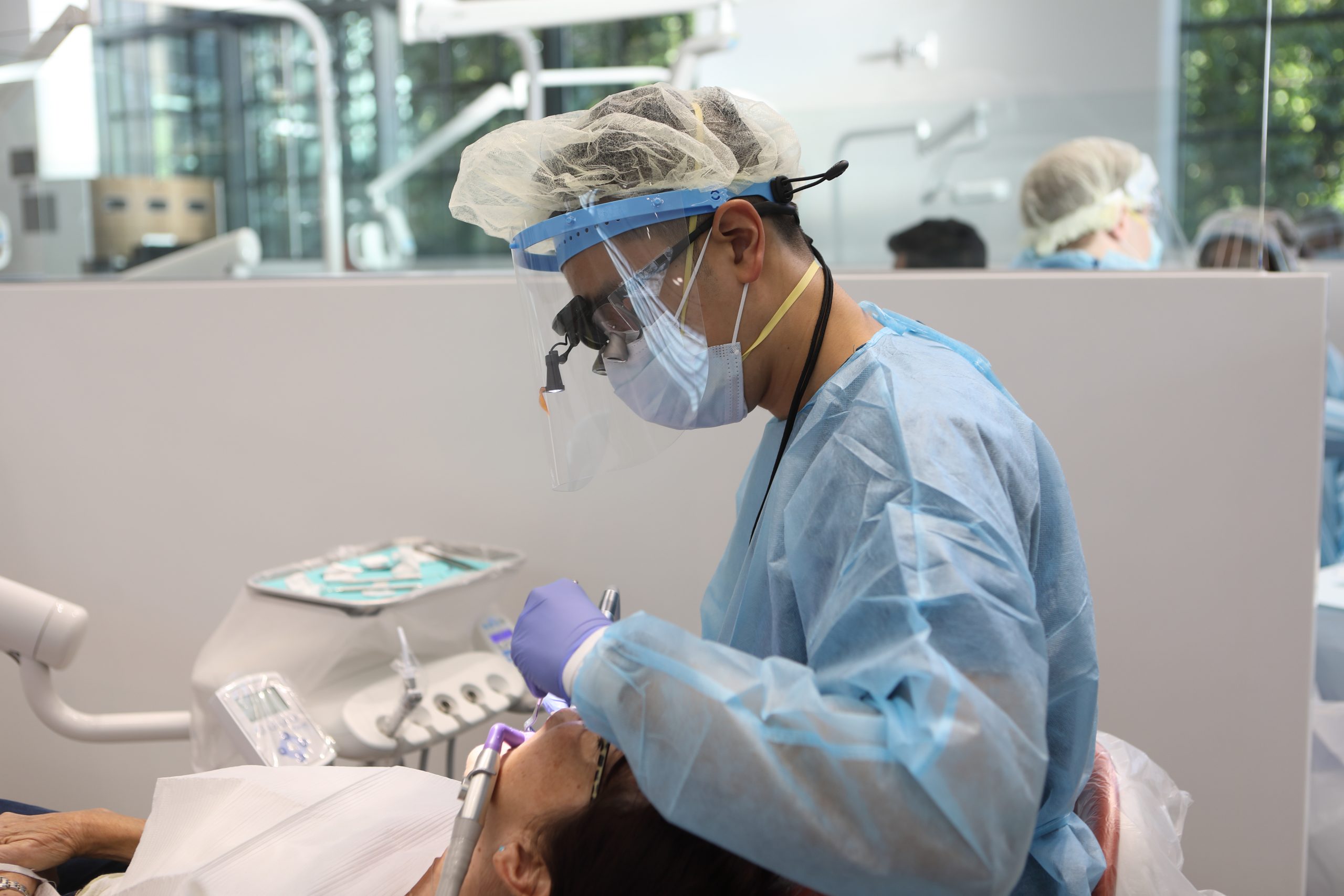Penn Dental Medicine is hosting a new patient Admissions Fair for Veterans on November 14th
Did you know brushing and flossing don’t just keep your smile bright and breath sweet? They also play a critical role in keeping you from developing periodontal disease.
Periodontal disease (also called periodontitis, gingivitis, or gum disease) is an inflammation and infection of the tissues surrounding your teeth. It’s caused when plaque builds up on teeth from poor brushing and flossing. Left untreated, periodontal disease can lead to pain, loose teeth, trouble chewing, and even the need for tooth removal. Fortunately, top periodontists in Philadelphia can treat periodontitis at Penn Dental Medicine.
What to Know and Where to Turn: Treatment for Gum Disease in Philadelphia
How does periodontal disease damage gums and teeth? And what can you do if you develop it? We have the answers to these questions and more to help you regain good oral health and get your smile back if gum disease happens to you.
What Does Periodontal Disease Do?
As stated earlier, plaque appears when we do a poor and/or infrequent job of brushing and flossing. Plaque is a film of bacteria that sticks to your teeth. Once hardened, it can only be removed by a dentist or dental hygienist. Left alone, it damages the gums and causes them to pull back from the teeth, potentially even exposing the root. This can also allow pockets to develop between teeth and gums that can fill with more bacteria and plaque.
Ultimately, periodontal disease can cause pain, difficulty chewing, and lead to tooth loss. In fact, the CDC estimates that periodontal diseases are responsible for 70% of adult tooth loss.
 What Are the Symptoms of Periodontitis?
What Are the Symptoms of Periodontitis?
With periodontitis, you may experience:
- Bleeding gums after brushing or flossing.
- A pink-tinged toothbrush.
- Spitting out blood.
- Puffy, sore, or tender gums.
- Persistent bad breath.
- Gingival recession symptoms when gums pull away from teeth.
- Pain when chewing.
- A bite that doesn’t line up.
- Loose teeth.
- Pus or infection in the gums or between teeth.
If you are experiencing any of these symptoms, visit your Penn Dental Medicine periodontist immediately. The sooner periodontitis is treated, the better your chance of stopping or reversing the damage.
What Is a Periodontist?
A periodontist is a dentist who specializes in issues affecting the gums and bone, including the treatment and prevention of periodontitis and the placement of dental implants. A periodontist goes through three years of additional training after medical school and brings extensive knowledge and skills to provide you with optimal treatment.
What Does a Periodontist Do on the First Visit?
On your first visit, you’ll go over your medical and dental histories with the periodontist. Then, they will examine your teeth and gums to determine the extent of your infection and determine treatment. In some instances, the periodontist may use a probe to measure the spaces between your teeth or take X-rays to check on bone health.
How Is Periodontitis Treated?
Treatment will depend on the severity of your condition:
- Antibiotics may be prescribed if an infection is present and may include a topical antibiotic gel or microbiotic mouthwash.
- Scaling or root planning may be used with an anesthetic to deep clean under the gums and remove plaque and infection.
Surgical options include:
- Gum grafts to cover exposed roots where gums have receded.
- Bone grafts and guided-tissue regeneration to regrow bone tissue that may have been lost.
- Dental implants to replace lost teeth or support a bridge.
Your periodontist may also recommend platelet-rich plasma, where plasma separated from your own blood can help regrow lost bone or gum tissue.
What Happens if Periodontal Disease Goes Untreated?
You may not only lose teeth, affecting your smile and your confidence, but you may also run the risk of developing other health issues linked to poor oral health, such as heart disease, cancer, or diabetes.
How Can Periodontitis Be Prevented?
 The best way to stop gum disease is to develop good brushing and flossing habits and to visit your dentist regularly.
The best way to stop gum disease is to develop good brushing and flossing habits and to visit your dentist regularly.
Here in the Philadelphia area, it’s easy to make an appointment at Penn Dental Medicine for an exam and cleaning. Just call us at 215-898-8965 or contact us here for patient-centered care at affordable rates. We accept direct payments from most dental insurance plans and all Medicaid plans offered to residents of Southeastern Pennsylvania. (Some of our patients have asked, “Does Medicare cover gum disease treatment?” Medicare itself does not.)
If you’re concerned that you may be developing periodontitis and need treatment for gum disease, your dentist will be able to reassure you or connect you directly to a periodontist right here in our office if necessary. Either way, your oral health is in good hands at Penn Dental Medicine, one of the most trusted names in dental care in the region.
Give your teeth and gums the attention they deserve and schedule your visit to Penn Dental Medicine today. We look forward to seeing you soon.
Get Your Appointment Now
We look forward to serving you and your family.




